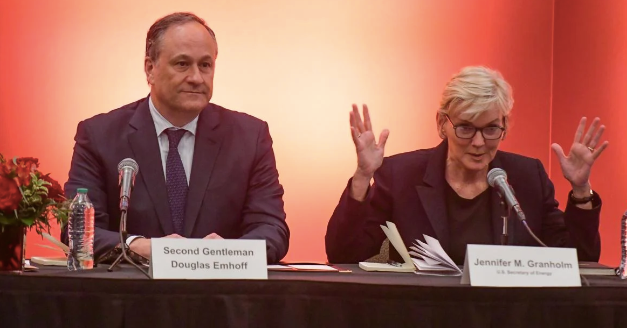
U.S. Secretary of Energy Jennifer Granholm and Second Gentleman of the United States Doug Emhoff announced Friday on the
campus they are interested in working with tribal leaders to convert hydraulic fracking wells to thermal wells to create geothermic energy.
Granholm and Emhoff met with tribal leaders and OU energy experts for a closed roundtable discussion that focused on “how the power and potential of geothermal energy can be harnessed for the benefit of Indigenous communities,” the university reported in a news release.
The visit is part of the Biden-Harris Administration’s “Investing in America” tour to highlight investments throughout the country.
“We are incredibly grateful to have hosted Secretary Granholm, Second Gentleman Emhoff and our Tribal leaders at the University of Oklahoma,” said OU President Joseph Harroz Jr.
“Our discussion today honors our shared commitment to working together to develop sustainable energy solutions for people and communities across America. At OU, we are leveraging more than a century of energy expertise to unlock new energy pathways that will power future generations.”
Tribal Nations met with Department of Energy representatives and OU energy faculty to discuss Oklahoma’s potential for geothermal energy production as a component of energy sovereignty, according to a news release from the university.
The discussion also addressed multiple renewable energy resources as vital components of energy sustainability and economic security.
The Department of Energy presented the guests with the White House’s newly published “Guidebook to the Inflation Reduction Act’s Clean Energy and Climate Investments of Indian Country, according to the release.
Granholm said the Biden-Harris administration is interested in protecting the livlihood of Native nations.
“This is a really exciting conversation for us because of the respect that this administration has (for Native nations), but also the potential within the territory of tribal nations for clean energy,” she aid.
Granholm said the Biden administration was impressed by the state of Oklahoma as a leader in energy, not just from oil and gas, but from wind energy.
“Oklahoma, in particular, is such an energy state – fossil energy and renewable energy – the fact that 42% of the energy here is generated by wind alone, and that your students won this collegiate competition is very exciting,” she said.
Both Granholm and Emhoff said Oklahoma and its tribal nations would be great partners with whom they want to develop relations in the field.
Emhoff said it is important for tribal nations to invest in renewable energy as they are often on the front line as it pertains to climate change, caused by the creation of energy.
“Native communities across the United States are on the frontlines of the climate crisis and often struggle to access affordable and reliable energy,” he said.
Granholm referred to the Enhanced Geothermal Shot, a part of the U.S. Department of Energy and an initiative to create geothermal systems to Americans nationwide.
“It’s super exciting because the notion of being able to take oil infrastructure or oil wells, and use them to extract energy from the subsurface, it is not fossil energy but clean, reliable energy,” she said. “Geothermal is the heat beneath our feet.
“It is 24-seven base load power in this country, we’ve got to put gigawatts of clean energy on the electric grid in order to get to the Biden Harris goal of 100%, clean electricity by 2035 and net zero by 2050.”
Emhoff said this work is important as it will create partners with businesses, as well as new opportunities for employment.
“(OU) is training young students, grad students to do energy assessments and then go out into the world as engineers,” he said. “This new, clean economy, is building jobs, jobs and more jobs.
“We are working together at the Biden Harris administration with universities and the private sector and tribal nations.”
Granholm said Oklahoma may not be well known for shallow geothermal activity, such as that found in the intermountain west, but hydraulic fracking wells allows for technicians to tap into geothermal activity deep in the earth.
“You don’t have to get just the stuff that’s closer to the surface,” she said. “You can go a lot deeper because again, of the techniques that the oil and gas industry have perfected, like hydraulic fracturing, that allows them to go deeper.
“So this is why Oklahoma is a perfect place to be able to demonstrate this next generation of geothermal production.”
In attendance were tribal leaders from Citizen Potawatomi Nation, Muscogee-Creek Nation, Chickasaw Nation, and Cheyenne Arapahoe Nations.



